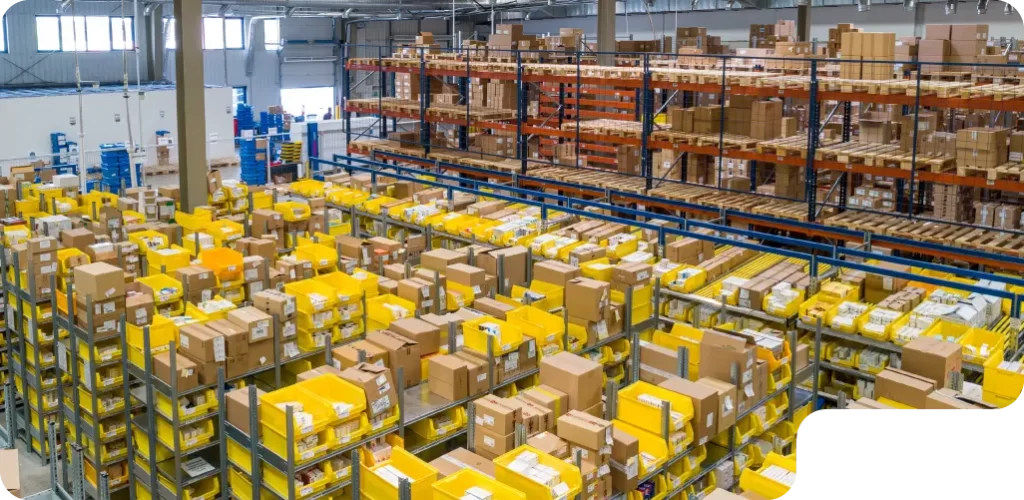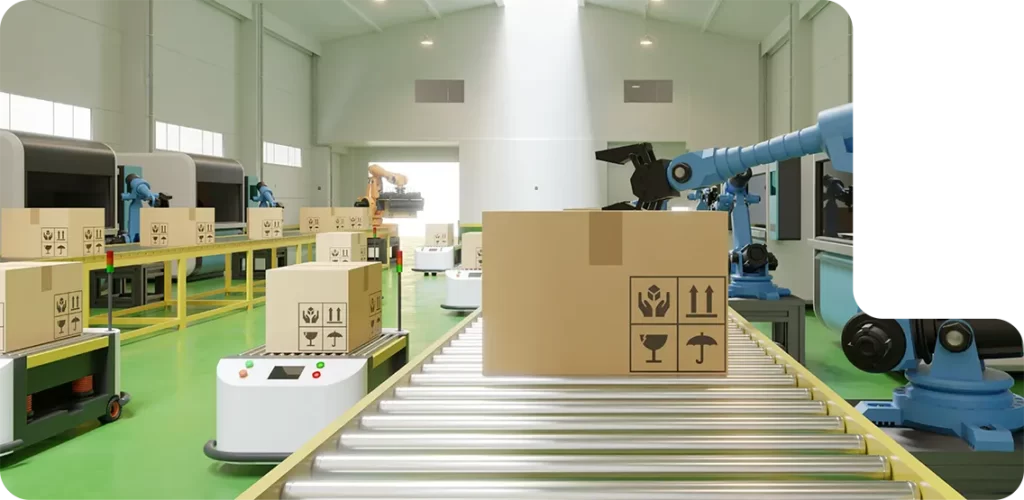Table of Contents
More Supply Chain Content
Get the latest e-commerce industry news, best practices, and product updates!
Table of Contents
More Supply Chain Content
Share This
Get the latest e-commerce industry news, best practices, and product updates!
Table of Contents
Share This
More Supply Chain Content
Get the latest e-commerce industry news, best practices, and product updates!
The world of e-commerce is filled with terms that might be confusing to people who are not familiar with it. One of these terms is ‘Supply Chain’. Even though the supply chain is an essential aspect of any business, many people cannot understand its meaning. In e-commerce, the supply chain refers to the network connecting a business, suppliers, and customers in a chain of processes.
If you own an e-commerce business, the supply chain process for the products you sell begins with the manufacturer making a product and ends when the final customer receives the product. In between are a lot of processes, suppliers, organizations, and people involved that help to make the final delivery possible finally. This article will explain the supply chain and management process to you.

What is a Supply Chain?
A supply chain, in simple words, is the system or path that a product travels through to reach the final customer. If you are a new e-commerce business owner, the term might be alien to you. A supply chain refers to the stages through which a product has to go until it reaches its final customer.
Effective supply chain management is an integral process in your business and essential to making your customers happy. Creating an attractive website and having a lot of products for your customers is not enough. In a brick and mortar store, the customers can visit the shop, see and touch the products and interact with the employees before they purchase.
But in an online store, the only thing that the customers judge your products based on is how it looks on your website and the reviews and ratings other customers have given your product. Since the customer experience is different, the supply chain of an e-commerce business is also vastly different from a brick-and-mortar store. In a physical store, the supply chain ends when a customer buys a product from the store and makes the payment. But in an e-commerce business, the product has to go through an order-fulfillment process before it is delivered to the final customer. The process has to be fast in order to satisfy the customers but you cannot compromise your product for speed. That is why managing your supply chain well is an integral part of running an e-commerce business.
What is Supply Chain Management?
In an e-commerce business, the customers only physically interact with your business when they receive the product from the delivery person. The rest of the process happens online. But that is why you have to make fast deliveries without compromising the quality or integrity of your product. To make this happen, you will need Supply Chain Management.
Supply Chain Management (SMC) is how a business manages all the funds, resources, entities, and information that goes into making a successful supply chain for the company. It starts with addressing the manufacturer who makes the product to the end of the supply chain when the customer receives the finished product they have ordered.
In the supply chain, there are many entities that make each of the links that connect the whole process together. These entities include retailers, manufacturers, vendors, transportation companies, warehouse and logistics partners, and finally the customer that buys the product. Managing each of these links properly is the key to making your customer happy. A successful supply chain management process is integral to the success of your business.
Managing your company’s supply chain includes planning, controlling, and monitoring all the entities that connect the different sectors of your business. You have to take care of many processes in supply chain management.
Strategic Planning Process
The first stage of supply chain management starts with the process of strategically analyzing the entirety of your supply chain and making evaluations. After these evaluations are made, you will know the best ways to optimize your supply chain in the best interest of your company. You have to design your supply chain based on the data that you procure. All the data related to your supply, resources, locations, transportation and products should be included in the process. This will help you react faster and more accurately if any immediate need arises in your supply chain network.
You also have to analyze all the data related to your vendors and purchasing statistics to help you procure a set of suppliers. These core suppliers will have a strategic relationship with your company that will help you procure the materials your company needs.

Demand Planning Process
Another process in supply chain management is demand planning. Demand planning is the process of analyzing available data to predict or forecast the demand for a product. It is one of the ways to make sure that all the products are delivered reliably. It is a fundamental management process because it can help you predict the revenue of a product in the future. This will help you forecast the ups and downs in your demand, and then you can correctly manage your inventory based on the data.
For example, after analyzing previous data, if you see that a certain type of product is bought more frequently during the holidays and then the sales drop a considerable amount, you can store more of that item in your inventory during the holidays and then store less after it. This will help you optimize your inventory and make the most profit out of your business.

Supply Planning Process
Supply planning or supply management is an integral part of a business’ supply chain management. In the previous demand planning process, you will get the data about what your customers’ demands will look like in the future, and this data will be used in the supply planning process. You will understand the requirements of the market and your potential customers through demand planning, and after that, you can plan the best way to fulfill these requirements through supply planning.
The main objective of these two processes is to balance both the demand and supply to optimize your business’s profits. This process also manages inventory, production, distribution, and capacity planning. All of these steps are integral in balancing the supply and demand of your business and understanding your company’s capacity.

Manufacturing Process
The manufacturing planning or manufacturing process refers to planning the production of a product. It includes scheduling, which means assigning the manufacturer with your orders depending on the data you gathered from demand planning and supply planning processes. You have to do it in a sequence that best supports your plans and the demand forecast. The other part of manufacturing planning is gathering data from previous costs and sales to manage production control and also to control the costing process properly.

Warehousing Process
The process of warehousing is vital for any e-commerce business. Warehousing refers to storing an inventory in a safe place to be later able to pack, ship, and deliver the product to the customer safely. Warehousing is essential because you have to take into account the ups and downs of your product demand and plan your inventory to support that correctly.
Over storing products will cost more, and if the products go bad, the money will be wasted. But if you under-store a product, you will not be able to meet the customer demands. If a product is constantly out of stock, customers will be displeased with your services. That is why an e-commerce business needs to manage their warehousing process properly.

Order Fulfillment Process
The order fulfillment process is an integral part of managing your supply chain. It starts when a customer orders a product. It involves stages like picking the product from the inventory in a warehouse, packing the product according to need, labeling the product, and finally shipping it out from the warehouse.
After the product ships out, it reaches the local center that stores the product before assigning a delivery person. The delivery person finally delivers the product to the customer. After this, if the customer decides to return the product, that also becomes a part of the order fulfillment process. It is a complex process that demands a lot of planning to execute flawlessly.
Delivering the order quickly and securely to the customer is very important for the image of an e-commerce business. That is why companies need to hire fulfillment partners and shipping and delivery partners very carefully. Based on the products they sell, the company also has to decide which type of order fulfillment best suits their company and then plan accordingly.
Supply Chain Process Best Practices
In the year 2022, e-commerce customers will be more demanding than ever before. With a plethora of options at their fingers, they try to find the best while making an online purchase. Companies need to make their customers happy with their products and their services. Improving your supply chain management process will inevitably make your service much smoother and quicker while still profitable.
Here are some practices that can help you improve your supply chain process.
- Firstly, you have to hire professionals that have niche knowledge of the supply chain management process and can help your company grow. You can hire staffing companies who are experts in hiring the right people for the right sectors. With the help of them, you can get a team that has professionals and will improve your supply chain process.
- You also have to have pleasant relationships with all your suppliers and manufacturers. If they are on good terms with you and your company, you can get a better price than the market. This allows you to cut back on production costs and make a profit.
- Instead of buying supplies in multiple installments, make bulk orders. If you do your demand planning correctly, you will be able to predict which products you will need and in what amount. If you buy these products from your suppliers in bulk, you will save a lot of money and also cut back on your transportation costs.
Conclusion
The supply chain is an integral part of running any business, and that is why it is essential for e-commerce business owners to understand the details of supply chain management. Supply chain management is key to the success of a business. You can have the best website layout and incredible products, but if the customers are unhappy with your fulfillment process and cannot profit, your company will not be successful. Business owners need to recruit people who have specialized knowledge in the supply chain field and can help you optimize your business.
Sign up today and LEAVE THE LOGISTICS TO US
Sign up, and we will get back to you within 24 hours to discuss what services would be best for your business needs. Or speak with us now and tell us what you need.
FAQs
The supply chain process of a business refers to the system that connects the business, all its suppliers and customers together. It is a network that begins with the manufacturing of a product and ends when a customer receives the final product.
The process of managing the whole supply chain of a company is known as supply chain management. There are a lot of processes included in it. All aspects of a supply chain have to work in perfect harmony to make a successful delivery. Supply chain management helps the business plan the best way to do so.
As we already mentioned, supply chain is the single most important system that makes up a successful business. Managing the system so that every link in the chain works perfectly is very important. That is why it is necessary for a company to have a supply chain management team who specializes in this field.
A supplier in a supply chain can refer to many entities. It can refer to the organization that supplies the raw materials for a product, and also to the manufacturer who makes and supplies the product to the company.
New technologies are always welcome in the e-commerce market. The more technologically advanced we become, the demands of the customer also changes. Artificial Intelligence (AI) and Machine Learning (ML) are some of the ways through which analyzing data has become much easier and the process of supply chain management has changed for the better as well.